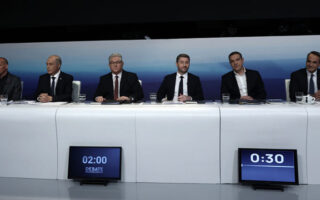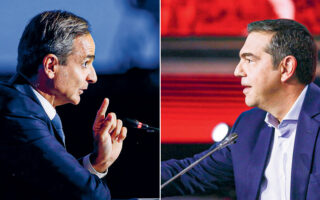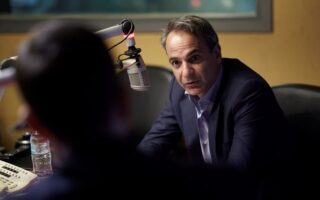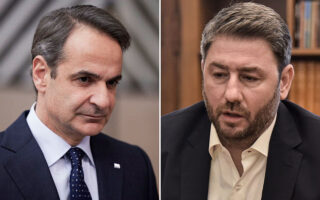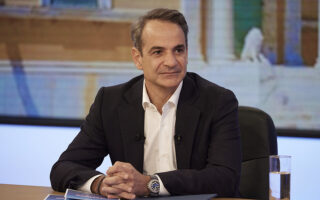Party leaders debate economy, foreign policy
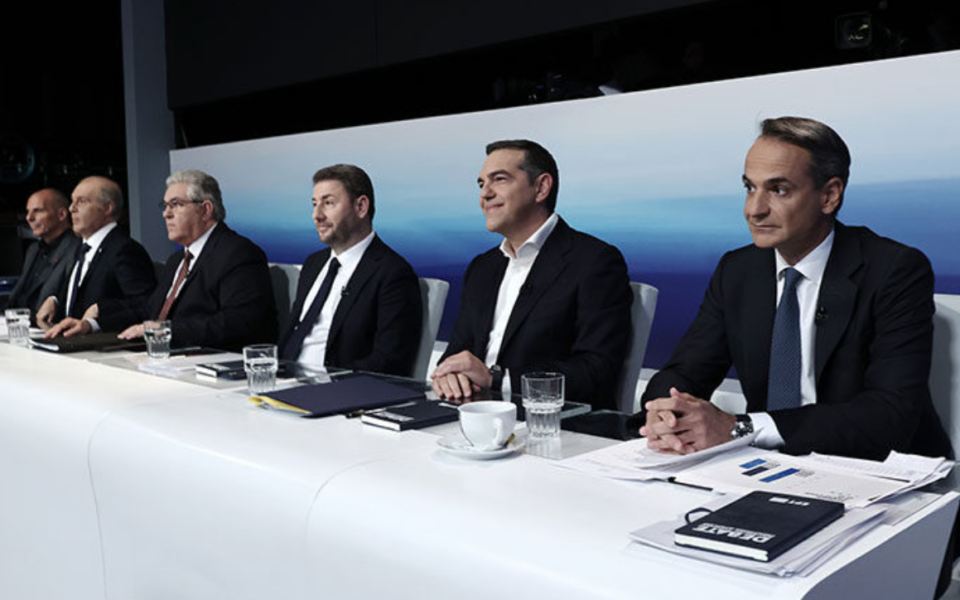
Greece’s political party leaders had differing takes on the economy and foreign and defense policies, although the debate format did not allow for overheated clashes.
Remarkably, and in a change from previous debates, all political leaders tried to hew to time restrictions; Communist Party leader Koutsoubas even apologized for taking longer than supposed to answer a question.
Economy
Prime Minister Kyriakos Mitsotakis expressed his hope that food prices, which outpace overall inflation, will stabilize; if not, he is prepared to extend the “market pass” policy into the second half of 2023. Mitsotakis shot down opposition proposals to lower VAT on a range of goods and services, saying such measures have not proven effective and have only resulted in lost revenue.
Opposition leader Alexis Tsipras said his program, with promises of tax cuts and higher wages, has been realistically drawn relative to its cost. He emphasized taxing excessive profits. He strenuously defended raising the wages of civil servants, including National Health System doctors, warning that stagnation at low wage levels will make the middle clash “vanish.” He also promised to go after funds that have bought non-performing loans from banks and attempt to repossess and sell off debtors’ properties.
Socialist leader Nikos Androulakis said he would protect debtors’ main residences from repossession and enact broader and more inclusive debt payment rescheduling schemes. He said tax breaks should benefit groups such as newlyweds and not help the rich, such as on inheritance taxation. On another point, Androulakis reiterated his objection to either Mitsotakis or Tsipras leading a coalition government in which his party, PASOK-Movement for Change, would take part in.
Communist Party general secretary Dimitris Koutsoubas said that only his party has an economic party that serves the people, while others serve the demands of Greece’s creditors and big capital, which is too lightly taxed, in his view. He criticized opposition parties to the left of ruling New Democracy for never voting in favor of various Communist Party proposals tabled in Parliament.
Kyriakos Velopoulos, leader of hard-right populist Greek Solution said he would change the countries productive model: he said that generating 75% of the country’s income from services is unsustainable. Would favor agriculture, jail tax dodgers and do away with “independent authorities” that are independent in name only.
MeRa25 leader Yanis Varoufakis, who was Finance Minister for the first, and tumultuous, six months of the Syriza government in 2015, said joining the euro back in the early 2000s was a mistake, but that he understand an exit right now would be too costly. He said that listening to Mitsotakis and Tsipras left him with the sense of deja vu, listening to a pre-financial crisis rhetoric about a strong economy. He argued that, on the contrary, Greece’s economy is defenseless. Varoufakis defended his proposal for a parallel electronic payments system, saying he was not talking about a parallel currency and is, in fact, against such a thing.
Foreign and security policy
Tsipras said he would honor the defense procurement agreements signed by the Mitsotakis government but would involve Greece’s armaments industry more in production. He also said that he would not tear down any border fences, but added they are not a solution to the migration issue. The EU must be more involved in border control, he said.
Androulakis also focused on Greek borders being European borders and that a European army is needed to guard them. Effectively dealing with Turkey would mean abolishing the veto on EU foreign poloicy and security decisions.
Koutsoubas said NATO membership only involves Greece on NATO’s wars of aggression, such as the “NATO-Russia war” and does not serve Greece’s interests. He also condemned the embargo against Russia. He said a Communist government would pursue friendly relations with all countries, adding that, if such a government were to come to power it would be as a result of people-driven changes happening across the world.
Velopoulos said that, in a multipolar world, Greece cannot be allied with one of the poles and added that Greece’s pro-western stance did not shield it from foreign policy calamities. He said he would rearm the country’s islands and “change” the Prespes agreement with North Macedonia, whom it accused of violating it repeatedly.
Varoufakis said that it is every government’s duty to defend national territory. Presented with a hypothetical scenario of Turkey occupying a Greek islet, he said he would not ask Greece’s allies’ permission before using the weapons in the country’s arsenal, but that he would also “make lots of phone calls.” He said his priority would be to call for a regional conference to resolve Greece’s disputes with Turkey over maritime jurisdiction.
Mitsotakis said his defense procurement program was necessary to strengthen the armed forces and fill gaps in funding caused by the financial crisis. He said he was glad to hear Tsipras say he would honor the agreements, argued that there will be added value for the country’s defense industry and said the agreements could not be renegotiated. He added that his government had to deal with a very aggressive Turkey and that it aggressively built alliances and that Greece now gets a friendlier hearing in the US Congress than Turkey. Asked about possible talks with the winner of next week’s Turkish election, Mitsotakis said he is ready to talk with anyone, but added that revisionism is “baked into the DNA” of all Turkish political parties.
